
57 minute read
ICONIC QUEERS
ICONIC QUEERS
History is littered with personalities. It’s through them that we learn about our past. We praise individuals in our communities for their pioneering work, often doing well in their field of expertise and in some cases while living their authentic selves. Two such persons who lived in Brighton and Sussex were Gluck and Edward Carpenter. Both are celebrated for their personal achievements as well as for living out lives during a time when to do so was in some cases illegal, and certainly not in keeping with contemporary opinion. Rory Finn looks back on their lives
Advertisement
Gluck
) It’s easy to think that some ideas and identities are new, dreamt up by the latest generation of queer people to grace our scene. Non-binary is a term that has grown in usage in the past few years and increasing numbers of people are identifying as such. Notable examples include Sam Smith and Jack Munroe. But as a concept it’s nothing new and genders that don’t fit into the traditional notions of male and female have been around for as long as we have. Gluck was a gender non-conforming British painter (1895-1978). Named Hannah Gluckstein at birth, and born into a wealthy family, Gluck was privileged to have the resources to pursue a life of their own. They received money in trust at the age of 21 and put themselves through art school in London from 1913 for three years. After that, Gluck moved to Cornwall to join an artists’ colony in Lamorna. However, Gluck didn’t want to be part of any particular art movement, and would prefer to feature their art in solo exhibitions. During their time at Lamorna, Gluck began curating themselves in a way that defied contemporary gender norms and fashion. They are presented in paintings by their contemporaries and in photos as smoking a pipe, wearing masculine style and clothing and pursuing relationships with women. The world of art scholarship will often use the feminine pronoun ‘she’ in reference to Gluck. In this piece we refer to Gluck as ‘they’. We do not know for sure how Gluck would have identified themselves, had they been living now, with the explosion in people coming out as non-binary and using the singular gender neutral pronoun, they/them, it’s quite possible that Gluck would have done the same. Gluck insisted on “no prefix, suffix, or quotes” and didn’t want to be titled, choosing to use only a shortening of their surname as their name. A famous example of the strength of feeling Gluck had on this issue is when an art society, of which Gluck was vice president no less, referred to them on a letterhead as “Miss Gluck”. Gluck resigned. As a lesbian icon to us all decades later, Gluck was known for having relationships with women. Their relationship with American socialite Nesta Obermer is depicted in the 1937 painting Medallion, named such because of a single object with two faces. Gluck referred to this as the YouWe portrait. This painting is perhaps one of the most recognisable and famous depictions of a queer lesbian relationship, having most notably featured as the cover image for Radclyffe Hall’s 1928
lesbian novel, The Well Of Loneliness, which follows the life of an upper-class woman called Stephen Gordon. The novel portrays queerness as natural, that we are born this way and pleads: “Give us also the right to our existence.” Gluck’s work is often exhibited as celebrations of queer love. Radical at the time, and perhaps still radical for some people to this day, that our genitalia should not define us. Gluck died in Steyning, Sussex, aged 82.

Edward Carpenter
) Edward Carpenter perhaps wouldn’t look out of place in modern Brighton. He was a gay rights activist, vegetarian, and pro animal rights. However, he was born a hundred years too early for the city we inhabit now, coming into the world in 1844. Carpenter’s family home was 45 Brunswick Square, Hove. He was educated at Brighton College, enjoyed playing piano and horse riding on the Downs and as a young man he discovered he "felt a friendly attraction towards my own sex, and this developed after the age of puberty into a passionate sense of love”. Carpenter’s exploration of gay sexuality led him into a close friendship, which had a “touch of romance,” with Edward Anthony Beck, whom he met at Cambridge. But this didn’t stop him from joining the Church of England as a curate after university. He experienced an increasing sense of dissatisfaction in the years that followed, with both the Church and university, and what he saw as Victorian hypocrisy. He found comfort

in the works of American poet Walt Whitman, which caused him to feel “a profound change”. After he left the Church, Carpenter moved to northern England to be part of the University Extension Movement, which introduced higher education to deprived areas of the country. He became increasingly interested in socialism and his political ideas have formed the basis of the British Labour movement. He particularly wanted to expand education to the working classes. It was during this time he found he had particular attraction to manual workers; "the grimy and oil-besmeared figure of a stoker" or "the thick-thighed hot coarsefleshed young bricklayer with a strap around his waist".
In 1891 he met George Merrill, a workingclass man from Sheffield who was 22 years his junior. They began co-habiting a few years later and this relationship endured until Merrill died suddenly in 1928. What is perhaps extraordinary is that this was of the era of Oscar Wilde’s trial, which saw him imprisoned in 1895 for homosexuality. Carpenter was a solid socialist and believer in social justice. He saw his homosexuality as not merely a state of being but a way to change society for the better. In his 1908 work, The Intermediate Sex, he remarked:
“Eros is a great leveller. Perhaps the true Democracy rests, more firmly than anywhere else, on a sentiment which easily passes the bounds of class and caste, and unites in the closest affection the most estranged ranks of society. It is noticeable how often Uranians of good position and breeding are drawn to rougher types, as of manual workers, and frequently very permanent alliances grow up in this way, which although not publicly acknowledged have a decided influence on social institutions, customs and political tendencies.” writing inspired the likes of DH Lawrence to write Lady Chatterley’s Lover as well as inspiring countless other peers of his time, by celebrating the homosexual condition as “a force in human evolution”. He is remembered by some as the "gay godfather of the British left".
Unsung iconic queers
) But what about the rest of us? It’s frustrating that any cursory glance at the past reveals mainly privileged, white, upper and middle-class individuals. There’s nothing wrong with being that in and of itself, but it has the effect of rendering everyone else invisible. History is written by the victors and those with authority have the power to shape the interpretation of it through their own lens. I would like to dedicate the rest of this feature to thinking about the unsung iconic queers. They say it takes a village to raise a child (who will later become a queer icon), so who is in this village of ours? Reading through the archives of Brighton Ourstory has been fascinating. The project started in 1989 and ran for over 20 years, chronicling what it could of LGB history in the city, with biographies like Carpenter’s to titbits that illustrate what life was like for lesbian and gay people in the city. This tradition has been continued in other projects, such as Queer In Brighton, an oral history project which collated a broad range of voices and contributions from individuals, many of whom have made Brighton & Hove the city people continue to see as having ‘streets paved in gay gold’. Just by existing here in the way we do makes this city iconic. 2014 saw the publication of another oral history project Brighton Trans*formed (Queenspark Books), which explored the lives of trans people in the city. Groundbreaking in itself for portraying trans people as happy, part of a vibrant and diverse community, just as the western world was experiencing its ‘trans tipping point’ and Caitlyn Jenner burst out of

the trans closet on to the cover of Vanity Fair.

We must record our lives for future generations or else they can easily get lost in the mists of time or the dominant culture. One method is for communities to come together and create zines, webpages, and now Instagram feeds. QTIPOC Narratives produced a zine and you can follow them on Instagram (details below). At time of writing, Brighton Museum should be reopening in September, but you can revisit some of the exhibitions online until then, including zines produced by the Queer On The Pier project, the stories behind the outfits in Queer Looks.
MORE INFO
D www.brightonourstory.co.uk D www.queensparkbooks.org.uk D www.brightontransformed.com/ I www.instagram.com/qtipocnarratives D www.brightonmuseums.org.uk/discover/fo
cus-on/lgbtq-history-practice/

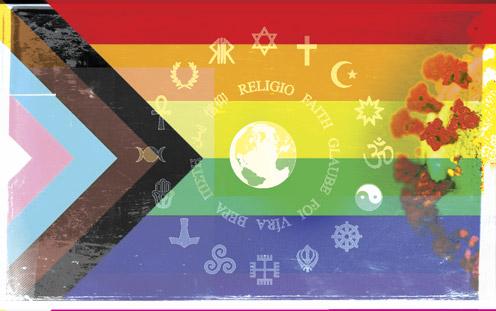
protest and were stopped by the police as if they were the ones on the wrong side of the wasn’t any chance to give them a last goodbye. People were basically disappearing. That’s the right word when you die without leaving a body or any other trace of yourself. No coffins covered in flowers, no eulogies, no goodbyes. Nothing but the memory of you remains. And if the only ones who remember you disappear as well, it’s almost like you never existed.
One case in particular occurred in Italy (again) when, after the death of a transsexual woman, newspapers used her male birth name, still refusing to give her proper female pronouns and the name chosen during her transition. Her new identity was erased, like it didn’t exist. HOW THE BELIEFS OF These things often happen when the families of the departed don’t allow friends and OTHERS AFFECT OUR LIVES partners to be involved in planning and attending their loved one’s funeral. Fabio Dragotta looks at how doctrine can impact The LGBTQ+ community has been a section of those affected by the pandemic, and still is, in on communities different ways. I wonder how many have been left out of the mourning process, not only for prevention reasons, but as another form of ) A few weeks ago in Lizzano, Italy, Don convictions are not imposed on other prevail over us. Giuseppe Zito, parish priest of San Nicola Church, started preaching during his sermon against a bill recently proposed to the Italian Parliament to protect the LGBTQ+ community from violence and prejudice. Considering it a menace to the expression of a legitimate opinion and to the traditional family, he gathered a group of followers with leaflets to pray and “defend it from the pitfalls that threaten it, including the bill against homotransphobia”. Apparently nowadays Church has become political, probably for fear of the consequences for all the lies it keeps telling about LGBTQ+ people. If this bill is a threat, what about more than nine centuries of oppression, killings and public shaming of homosexual and transgender people led by the Church? How much of this do we still have to endure? Conveying this kind of message during mass, often attended by an impressionable audience, is like creating propaganda against our community. The peak that day came when a group of people who were against that priest’s ‘opinion’ gathered in front of the church with banners and rainbow flags in a peaceful people’s lives. With all the pressures and limitations we’re under in this difficult time, can the beliefs of others become a barrier to our freedom? When we are young and still discovering our true selves, living in families with deeprooted ideas about homosexuality can lead us to self-loathing, internalised homophobia and suicidal thoughts. Given we are often forced to attend religious gatherings of some kind from childhood, it’s sometimes really difficult to get out of that mental prison in which people’s ideology can confine us. Some of us grew up in a time when homosexuals dying from Aids were refused funeral ceremonies in church by priests who considered them victims of God’s wrath. The Gay Plague, they called it, despite homosexuals not being the only ones affected by it. This also led to a vision of HIV+ people being ones to watch out for, creating stigma inside our own community. Another ‘plague’ is currently going on. Many lives have been changed and taken during this global pandemic. And since, until a few weeks ago, it wasn’t even possible to arrange funerals for the victims of Covid-19, there Throughout this horrifying scenario, clergymen all around the world did not take a step back. Through the words of some of them it was stated that Covid-19 was a “sign from God” and a "divine punishment against homosexuality”. Little did they know that, weeks later, ironically, some of them would have been infected or died from Covid-19 themselves. The UK is surely a step ahead in recognising LGBTQ+ rights, but there are cases in which stigma remains anyway. When will this injustice stop? Confined within four walls, our reality has changed in recent months. We started seeing things in a different way, as if death is always there, lurking, waiting to catch us. The danger is practically in the air we breathe and it’s so easy to surrender we can’t even fight back. When we are defeated, we depart for another world – or at least for those who believe in such things. But some beliefs - religious or not - are still hard to defeat. In reality, ignorance is always lurking, ready to attack. Someone once said: “Your liberty to swing your fist ends where my nose begins.” With all that’s happening in the world, now more than ever these words are so true. rejection. In these cases, the beliefs of others barricade or were breaking some law. “The LGBTQ+ community has been a section of those But what law? Or better, whose law? affected by the pandemic, and still is, in different Religion is something in which people seek ways. I wonder how many have been left out of the comfort and haven, but it can also be a cage mourning process, not only for prevention reasons, with golden bars. Some spend their entire existence under the influence of a greater but as another form of rejection. In these cases, the power, and that’s okay as long as their beliefs of others prevail over us.”
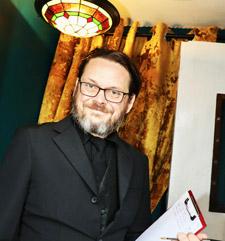
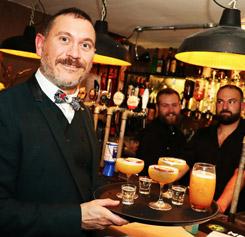
E 129-130 St James's Street, Brighton BN2 1TH ) Open: Fri, Sat & Sun, 7pm-2am; Mon, 7pm-midnight D www.nautiluslounge.com F @NautilusLounge ) Steven Lee and the crew from Subline Brighton are embarking on a new venture with the launch of Nautilus Lounge, a new venue in the heart of Kemptown. Expect a warm welcome and relaxed atmosphere, with a selection of the best cocktails, a fine choice of wines and fizz, premium spirits and beers, and some decent grown-up soft drinks, as well as all the standards. Full drink menus will be published on the bar website and orders will be placed with a crew member so you can sit back and relax.
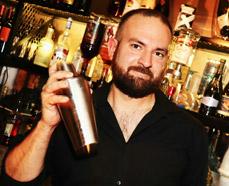
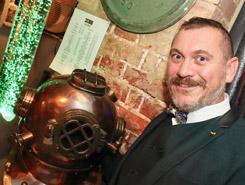
As for events, Nautilus Lounge is excited to have Ian Sinclair donning his quizmaster hat again; and now the Quiz will be every Monday. Beyond that, it’s anticipating the chance to welcome back Club Silencio, and to extend the range of theatre, music, and cabaret, though safety prevents this in the launch period. Steven Lee, owner, says: “You'll descend from St James' Street and below the waves into the luxurious lounge or cosy crew quarters, each a comfortable inclusive space. Nautilus Lounge will be seated throughout and fully waiter served, which - alongside social distancing and thorough cleaning routines - helps to keep the venue as Covid-safe as possible.”
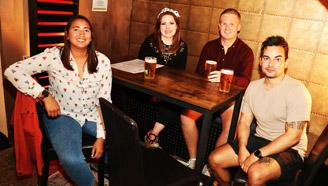

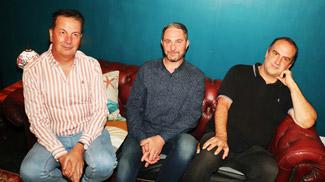
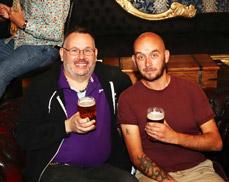

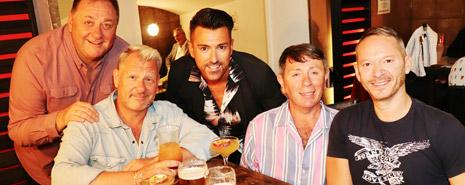


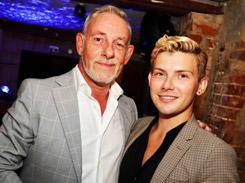
The Nautilus Lounge crew will be doing all they can to reduce risks and transmission of Covid-19, so spaces are limited, and reservations will be available by messaging on Facebook. As the regulations currently stand Nautilus Lounge can accept groups of up to six people from a maximum of two households (bubbles permitted). On arrival Nautilus Lounge will comply with tracking advice and require one responsible person from each party to sign in via a text message, and after that they'll do all the hard work.

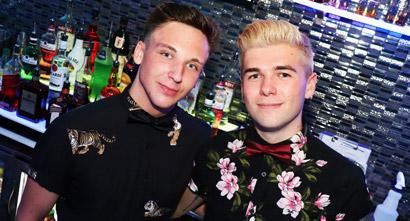
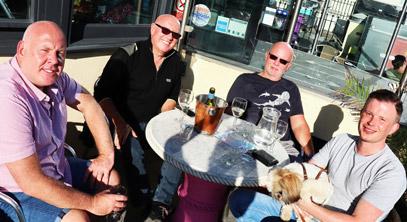
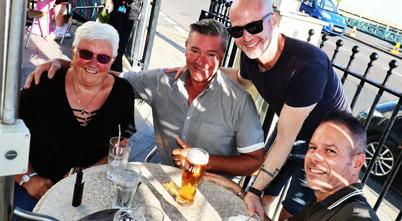
AMSTERDAM

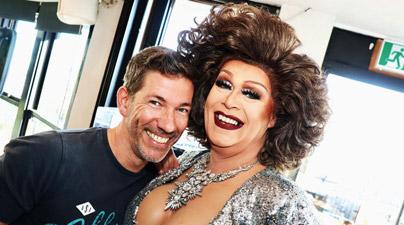

AMSTERDAM
SEPTEMBER 2020 We’ve all missed our LGBTQ+ venues, which have been closed since March due to the coronavirus pandemic. Most of them have now returned, bringing the heart back to LGBTQ+ Brighton, Portsmouth, Southampton and Crawley, so here’s a round-up of what you can expect and what they have planned to make your visit as comfortable and safe as possible.
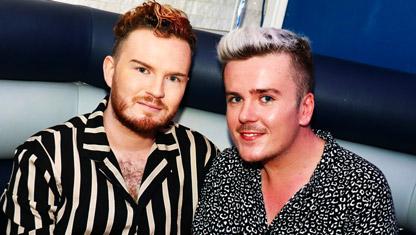
AMSTERDAM
AFFINITY BAR E 129 St James’ Street, Brighton BN2 1TH N Tel: 01273 567935 F @ AffinityGayBar ) Open from 12pm every day. ) Drink deals: 2 cocktails for £12 on Friday, choose from Tequila Sunrise, Long Island Iced Tea, Porn Star Martini, Margarita or Woo Woo. Affinity Bar says: “Whether you fancy a Porn Star Martini or a Margarita these cocktails will delight.” Cabaret on Saturday at 8.30pm; double cabaret on Sunday at 6pm & 9pm. Affinity Bar adds: “Join us at Affinity Bar and enjoy air-conditioned comfort, fabulous cocktails, a wide selection of sprits and cool beers served up by our friendly, attentive bartenders.” AMSTERDAM BAR & KITCHEN E 11-12 Marine Parade, Brighton, BN2 1TL N Tel: 01273 670976 D www.amsterdambrighton.com F @ amsterdambarbrighton ) Now offering table service for drinks and delicious food, including Sunday roasts. Stick around on Sunday to catch some of the scene’s top cabaret acts performing from 5.30pm. Bookings for cabaret and food/drinks recommended.
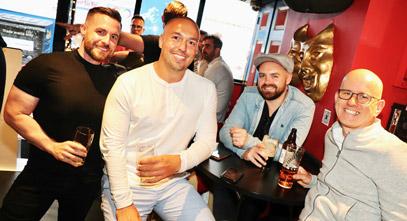
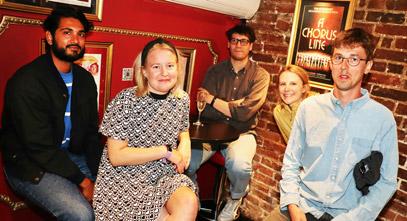
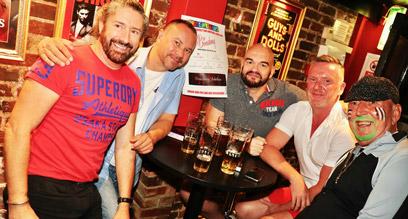
BULLDOG

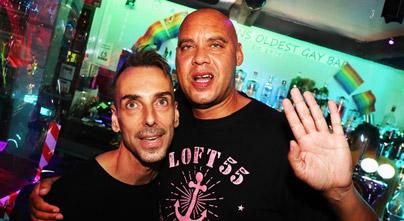
BULLDOG
BULLDOG

BULLDOG

BAR 7 CRAWLEY E 7 Pegler Way, Crawley, RH11 7AG D www.bar7crawley.co.uk F @ Bar7Crawley ) The heart of LGBTQ+ Crawley is open every Friday, Saturday & Sunday from 7pm till late with Lounge Bar and table service only. Bar 7 says: “We add style and glamour to our Covid cleaning routine. If she’s not on her knees, she’s on the table, over the chairs and taking extra precautions to keep you and our staff safe. Please support your local LGBTQ+ venue.” BAR BROADWAY E 10 Steine Street, Brighton BN2 1TE N Tel: 01273 609777 F @ barbroadwayuk D www.barbroadwayuk.co.uk ) Broadway Jukebox is back for you to request your fave showtunes and songs from films and TV all week. Fancy yourself as a brain box? Thursday is The Rossy Wossy Quiz at 8pm. See Facebook page for full guidelines. Before you visit check the new ‘appless app’ (just need browser) to make your visit effortless while remaining safe. It allows customers to book a table, pre-order and pay for drinks from the table, contact members of staff, virtually queue for the toilet and call a taxi.
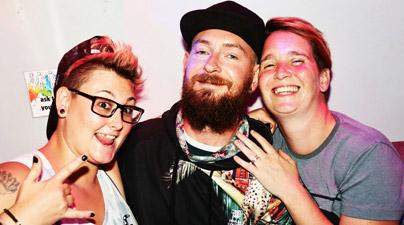
BULLDOG ALL NEW E 31 St James's Street, Brighton BN2 1RF N Tel: 01273 696996 F @ BulldogBrighton ) Now open with a Covid-19 secure venue, individual booths and table service, ready and waiting for you to get your glad rags on! Pop down for Sunday Funday, beat those new-week blues at Glitter Ball with Sam Pink and Pete the Meat on Monday, or kick the weekend off in style at Transvolve on Friday, where the camp is turned up to the max! All New Bulldog says: “There’s no karaoke at the mo but still paint that face! Heel up and #getinvolvedsue for a fun filled night in the heart of gay Brighton!”
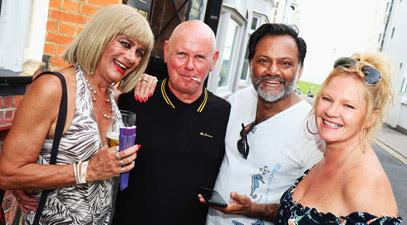

CHARLES STREET TAP

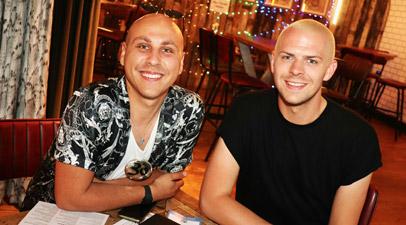
CHARLES STREET TAP


CHARLES STREET TAP


CHARLES STREET TAP
BEDFORD TAVERN E 30 Western Street, Brighton BN1 2PG N Tel: 01273 739495 F @ BedfordTavernBrighton ) Bar is still closed but keep checking their Facebook for updates. Adam and Team Bedford say: “We’re desperate to get our Bedford family back together in our beloved Beddy, but we have a duty of care to our fabulous staff and customers. Implementing social distancing within such an intimate venue will be challenging. We hope to be able to see you soon. Lots of love.” CAMELFORD ARMS E 30-31 Camelford Street, Brighton BN2 1TQ N Tel: 01273 622386 F @ TheCamelfordArms I @camelfordarms D email camelfordarms@hotmail.com D www.camelford-arms.co.uk ) Now open for food and drinks from 12–8pm, including award-winning Sunday roasts from 12pm. Bookings not necessary but recommended if eating - email or message on Facebook or Instagram. Get your thinking cap on for Ben’s Quiz on Thursday from 8pm. CHARLES STREET TAP E 8 Marine Parade, Brighton BN2 1TA N Tel: 01273 624091 F @ CharlesStreetTap D www.craft-pubs.co.uk/charlesstreettapbrighton ) Check the new menu of small plates, stone-baked pizzas, burgers, mains, sub sandwiches, sides and desserts: https://bit.ly/TPK-MENU. Order food and drink direct to your table via new crafty app -
https://bit.ly/MyPub-Apple http://bit.ly/MyPub
Android. Thursday from 8pm is free We Love Quiz with prizes on the night in the pub and a national cash prize pot up to £1,500 each night. Go to www.welovequiz.co.uk for details. To book a table, contact the bar.



LEGENDS
LEGENDS
LEGENDS


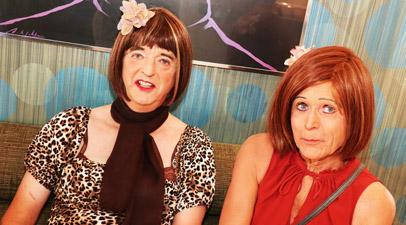
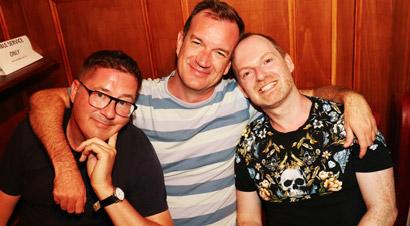
THE EDGE E Compton Walk, Southampton, SO14 0BH N Tel: 023 8036 6163 E contact@theedgesouthampton.com FTI @ EdgeBoxSoton ) Open Wednesday to Sunday from 8pm with free entry, cocktail pitchers from £8 and tunes all night! No booking required but arrive early to avoid disappointment or email in advance. For house rules, check their Facebook page. Wednesday - Bar 150 returns from 10pm with house singles, Jägerbombs or bottle of Becks £1.50, bottle of house spirit £40.
LEGENDS
FALLEN ANGEL E 24 Grafton Street, Brighton BN2 1AQ E fallenangelbrighton@gmail.com F @ FallenAngelBrighton I @ fallen_angel_brighton/ ) The Fallen Angel is thrilled to announce it will be reopening on Friday, September 4 from 3pm. Keep checking Facebook for updates or send an email for more info. Fallen Angel team say: “Check FB and Insta for updates. See you all very soon... Lots of love.”

GROSVENOR BAR E 16 Western Street, Brighton BN1 2PG N Tel: 01273 438587 F @ www.thegrosvenorbar.co.uk ) Open daily from 1–11pm. Friday and Saturday cabaret has returned with the scene’s top acts on the Grosvenor stage from 9.30pm. Limited space so arrive early to avoid disappointment. Call ahead to book a seat (tables of four or less only).

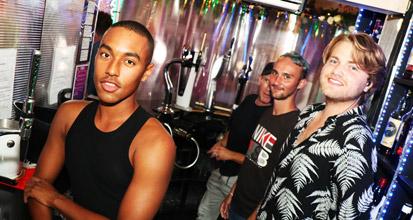
REGENCY TAVERN
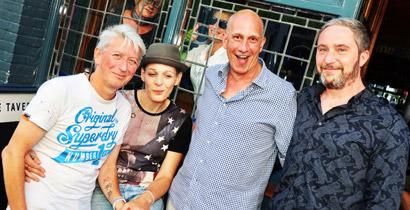

REGENCY TAVERN
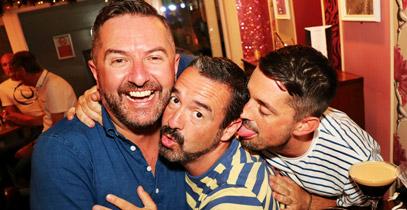
REGENCY TAVERN

REVENGE
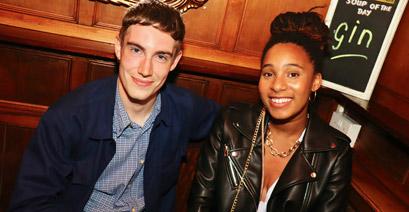
HAMPSHIRE BOULEVARD E Hampshire Terrace, Portsmouth PO1 2QN N Tel: 023 9229 7509 F @ HBnightclub D www.hbnightclub.co.uk ) Bar now open with full table service, refurbished décor and covered terrace: Sun 5pm–1am, Wed & Thur 7pm–1am, Fri & Sat 7pm–3am, closed Mon & Tue. Drinks: half price drinks at the Monday Club, 7–11pm; pitcher of Fosters or Strongbow £15 on Thursday, Cherry’s Bingo with cash prizes every Thursday from 8pm. DJs spinning top tunes on Friday & Saturday from 7pm. If you’ve missed your cabaret queens, then hop over to the HB for Sunday Social Cabaret from 6pm. LEGENDS BAR & CLUB E 31-34 Marine Parade, Brighton BN2 1TR N Tel: 01273 624462 F @ LegendsBrighton D www.legendsbrighton.com ) The bar and terrace now open with great food available till 5pm; bar open till very late. Frank's fantastic Sunday roasts, including his tasty vegetarian special, are back: 12.30-4pm. Call ahead to book your table. The hotel is also open, and you can book via website or on Facebook by clicking Book Now. Swing round on Friday and Saturday to catch DJ Patch spinning a great background soundtrack from 10pm. Legends says: “Join us at Legends bar and our subterranean lounge; a unique, sexy, and gorgeous space that perfectly complements our bar above.”
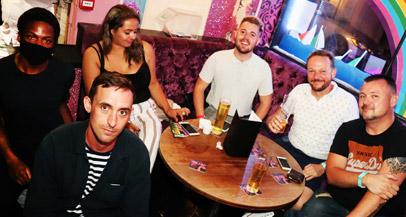
MARINE TAVERN E 13 Broad Street, Brighton BN2 1TJ F @ marinetavernbrighton ) The bar is now open daily from 12pm–1am.
NAUTILUS LOUNGE E 129 St James's Street, Brighton BN2 1TH D www.nautiluslounge.com/ F @ NautilusLounge ) Open 7pm–2am Fri, Sat & Sun, and 7pm–midnight on Mon. Expect a warm and relaxed atmosphere, the best cocktails, wines, fizz, premium spirits, beers, grown-up soft drinks. Monday Quiz with Ian Sinclair. Steven Lee, said: “The pre-pre-opening was more successful than I'd dared hope. We really enjoyed it, and the guests did too! Limited space means we recommend reserving a table - just message the page and we look forward to welcoming you!”
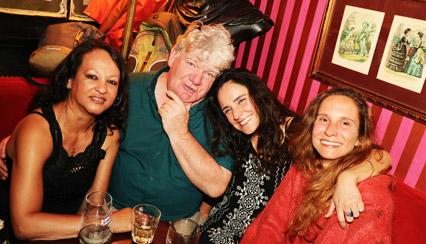

BAR REVENGE
BAR REVENGE
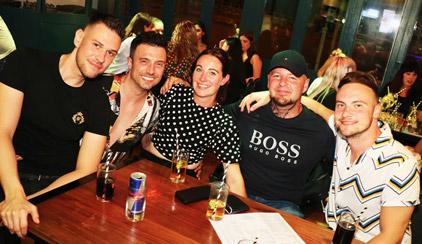

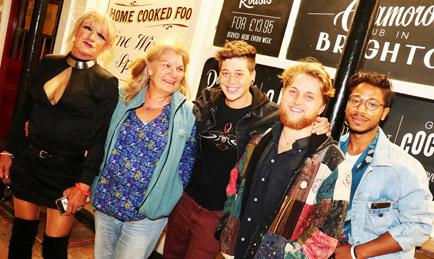

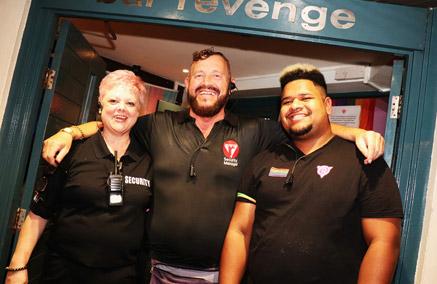

BAR REVENGE
THE RAILWAY CLUB E 4 Belmont, Dyke Road, Brighton BN1 3TF N Tel: 01273 328682 F @Railway-Club-Brighton-129870610360892 ) Now open Monday–Wednesday & Friday 5–10pm, Thursday 11am–10pm, Saturday 3–9pm, closed Sunday. Please note: Where only a few members, or no members are present in the evening, the bar and club may close early. Railway Club Brighton says: “Our Retired Section is now back on Thursday so if you’re lost for what to do why not pop along? We are also restarting the bonus ball and tote. Tote starts off at £30, if not won it goes up by £30 a week till it’s won, and it only costs 50p to have a go!”
BAR REVENGE
REGENCY TAVERN E 32/34 Russell Square, Brighton BN1 2EF N Tel: 01273 325652 F @ trtbrighton D www.regencytavern.co.uk ) Open from 12pm for food, drinks and entertainment including: Saturday cabaret at 9pm: Lucinda Lashes (5) and Snow White Trash (12). Booking recommended. Check Facebook for full lineup. Sunday roasts served while Paul plays relaxing lounge music, call ahead to book a table. CabaRegency is back every fortnight – Friday (4) and Friday (18) from 8.30pm with host George Martin Marino and some of Sussex Performing Arts community's biggest names. Regency Tavern say: “The intimate, breath-taking cabaret night featuring audiences who can never believe what they're hearing.” REVENGE BAR & CLUB E 32-34 Old Steine, Brighton BN1 1EL N Tel: 01273 606064 F @ RevengeBrighton D www.revenge.co.uk ) Revenge Bar is open with table service indoors and a takeaway service if you want to avoid the supermarkets and grab a bevvy! No advanced table bookings; first come, first served. You'll also be greeted by a GORG resident drag hosts who will be your maître d' for a camp ol' welcome to the bar; Lydia L’Scabies, Daphne, Tayris Mongardi and Rob From Finance. ) Revenge Club isn’t open yet but Powder Room events are chalked in the calendar for later in the year. Check Facebook for full line-up.

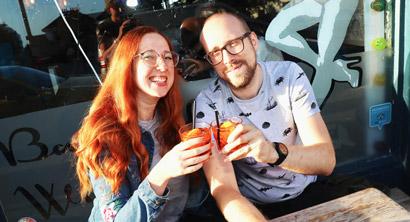


LE VILLAGE
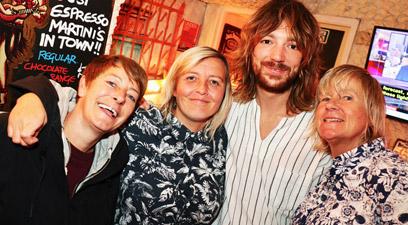
LE VILLAGE

LE VILLAGE
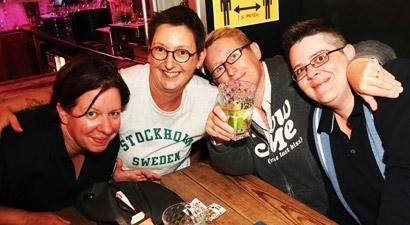
VELVET JACKS E 50-52 Norfolk Square, Brighton BN1 2PA N Tel: 07720 661290 F @velvetjacksbrighton ) Velvet Jacks is now open with table service inside, or you can take your drink outside, but social distancing means there’s no drinking at the bar. Jackie says: “Please stay one metre apart, even when you’re tipsy. And be nice. It's all we have right now.” LE VILLAGE E 2/3 High Street, Brighton BN2 1RP N Tel: 01273 676075 F @ thevillagekemptown ) Now open with full cocktail menu served from newly kitted out bar, a stunning beer garden with heaters and drag hosts at the weekend. Booking not necessary but call ahead to avoid disappointment. Le Village says: “Hey Villagers! Don't forget we have a lovely evening planned for you all. Our new cocktail bar is ready! We have a huge selection of drinks for you.” Keep an eye on Le Village’s Facebook for their new food menu, launching soon.

ZONE BRIGHTON E 33 St James's Street, Brighton BN2 1RF F @ www.zonebrighton.co.uk ) No definite date yet for the Zone reopening but keep checking the Zone Facebook page for up to date information about what they’re up to. The Zone says: “We are working hard to make everything safe before we reopen and we look forward to seeing you all again soon.”
SHOPPING
WITH MICHAEL HOOTMAN
) THE MAN WHO LAUGHS (Eureka bluray). German expressionist director Paul Leni’s adaptation of Victor Hugo’s novel is a masterpiece. In terms of imagery it’s certainly superior to the cycle of Universal horror pictures which were to follow in its footsteps. Early on a small child, his face permanently disfigured to make him a circus freak, wanders through a nightmarish landscape of corpses swinging from gallows; it’s terrifying and strangely poetic while conveying a small child’s abandonment. The adult Gwynplaine (Conrad Veidt) is still touring 17th century England, where he falls in love with another performer (Mary Philbin), yet this love is in danger of being thwarted by the machinations of the Queen’s evil jester, Barkilphedro (Brandon Hurst). The plot is melodramatic nonsense, but the style and the film’s performances - Veidt manages to convey absolute suffering despite his face carved into a ghoulish grin, and Hurst is magnetically creepy - make this an absolute must.

) New! Pentyl Aromas, £12 each or three for £30 (Prowler, 112-113 St James's Street, Brighton, 01273 603813)
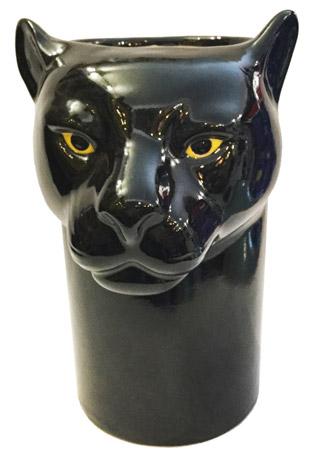
) BUSTER KEATON: 3 FILMS (VOL 3) (Eureka blu-ray). Another volume of silent comedy genius: Our Hospitality has Buster, the innocent young man, caught up in a deadly feud. The only way he can escape being shot is by making himself a permanent guest in the home of his would-be assassins. Go West has Buster abandoning city life to life on an Arizona ranch and mixes deadpan darkness with some of silent cinema’s greatest comic set pieces. In College: Keaton is a nerd whose sweetheart ditches him for an athlete – determined to win her back he enters college hoping to excel at sports despite having two left feet... ) ‘Barbara’ Utensil Pot, £37.50 (Pussy, 3a £19.99 (England at Home, 22b Ship Street, Brighton, 01273 205544) ) Brighton Beard
Company Canvas Toiletry
Bag, £15 (Hold, 14 Bond Street, Brighton) ) Bamboo Picnic Bowl, £9.50 (Dowse, 27 Gloucester Road, Brighton) ) Foraged Wood Pastry Brush, £13 (Workshop, 13a Prince Albert Street, Brighton,
) Orla Kiely Planter, Kensington Gardens, Brighton, 01273 604861)


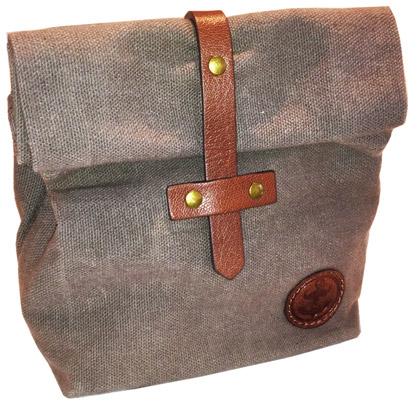
01273 731340)
TURN BACK THE PAGES
Gscene has been published every month for over 27 years, and is a rich chronicle of the history of our LGBTQ+ communities, in and around Brighton & Hove. Chris Gull raids the archives…
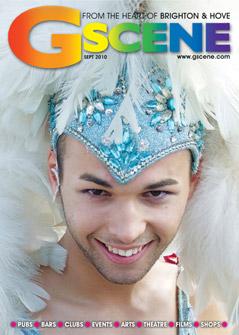
) As you would expect, our September trawl through the archives once again features Prides of the past and gives us a chance to compare reactions to Pride 2010 and Pride 2015. Regular readers will know that Pride 2010 was still free, still unfenced, still failing to raise money for local charities, let alone covering its own costs. In 2015 the ‘new’ (current) organisers of Pride staged their third event.
SEPTEMBER 2010
SUN SHINES ON BRIGHTON PRIDE
) Despite storm clouds early on the morning of Pride, the sun shone for most of this year’s event. Thousands gathered on Madeira Drive to cheer the parade led by officers from the Gay Police Association. Floats included entries from American Express, The Co-Op and Nandos. Voluntary sector organisations represented included the Brighton Gay Men's Chorus, THT, the Sussex Beacon, Allsorts, MindOut and Brighton LGBT Switchboard. Other entries included walking tableaux from the NHS Hospital Trust, Sussex Partnership NHS Foundation Trust, firemen and women from East Sussex, Hampshire and Kent Fire Brigades, the Royal Air Force and the Green Party. There were 55 floats in all on the parade. The theme of this year’s parade was Pride & No Prejudice. Some entries had a strong political and social message including the Students’ Union entry which featured people,
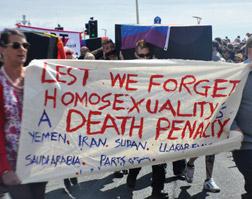
gagged round the mouth, carrying black coffins to protest about the countries where homosexuality still carries the death penalty. Generally, the content of the parade was disappointing. Following months of speculation as to whether this year’s event would take place at all, Sussex Police estimated 160,000 people on the park over the course of the day making it the best attended Pride ever. The park this year was extensively fenced with a special community section in one half of the park and a large screen in the centre of the park rerunning the morning’s Pride parade. During the day, messages were posted on the screen from community groups and leader of the City Council, Cllr Mary Mears, to revellers on the park. Bars on the park were branded by the Camelford Arms, the Star Inn, Vavoom, Revenge, R-Bar and Girls On Top. The owners of Revenge, who hold the bars contract for the park, have agreed to split the profits from the student bar on the park between Pride and LGBT Student Union groups from the local universities. Following the party on the park, celebrations continued in St James’s Street at the Village Street Party, organised by local LGBTQ+ businesses and run at a profit. Organisers of the street party confirmed they had met their budget and hoped to be able to pay off some of last year’s debts from the surplice of income generated. St John Ambulance said it dealt with 220 casualties with 11 of these being taken to hospital. Pride announced they needed to collect £40,000 on the day to balance the budget, but The Argus revealed that this total has not been raised. As we went to press two weeks after the event, Pride revealed that £23,482.49 had been raised in the buckets (Ed: 15p per person in the park). Sussex Police confirmed there were 39 arrests at the event. Seven arrests for assault, six for theft and 17 for drug offences. Pride campers at the Pride Camp Site at the Waterhall Playing Fields were attacked on Friday night shortly after midnight. A group of youths yielding baseball bats attacked campers in their tents. That’s the end of the 2010 Pride news… Here’s James Ledward’s editorial.
You cannot stop people coming to a free event. We are told this year’s Pride attracted the largest ever number of people to the park, the largest number of straight people that is. Groups of young straight boys carrying cases of alcohol roamed the park taking advantage of what has become for them the replacement to the former Southern FM Party On The Park. On the positive side, the community village idea worked well offering a safer quieter haven and the main attractions such as the Wild Fruit Dance Tent, Cabaret Tent, Women’s Performance and Calabash Tents drew large crowds as usual. I have to say everything else was a nightmare. The bottom half of Preston Park was at times quite simply dangerous. There were too many people squashed into a smaller fenced space than previous years. Once you were on the bottom half of the park you couldn’t get off or out quickly. Whoever agreed the layout of the park needs a good talking to. Any incident on the bottom half of Preston Park could well have ended in tragedy. Pride 2010 will be remembered as the Pride where the organisers lost the battle to re-gay the event. The event was more mainstream than ever before and had little relevance to most LGBTQ+ people I have spoken to. Yes the numbers were the largest ever but swollen by gangs of local youths. Bars in the Village reported a downturn of between 20-25% on turnover from last year, indicating less LGBTQ+ people coming into town as visitors. This is reinforced by the experience of the recognised gay-friendly hotels, many of whom had empty rooms for the weekend or only filled up on the day of Pride itself. Unheard of in the past. Pride’s traditional out of town visitors were fewer on the ground this year, many of them choosing to visit Amsterdam Pride and the Circuit Party in Barcelona. Most worrying was the lack of buckets on the park. I saw just one on my 45 minute visit to the park. I have always considered the sole role of Pride trustees was to make sure the collection of money on the park was maximised. Last year’s deficit was blamed on the rain. This year’s event had little or no rain and we were told by Pride it was the biggest and the best ever, but Pride told The Argus after the event they did not think they had collected enough money on the day to balance the books never mind to be able to give out money to our
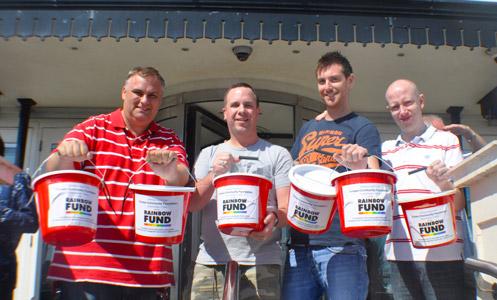
voluntary sector organisations. It would be in everyone’s interest if Pride announced their current financial position before asking people to give them money for next year and consulted community groups and businesses as to their mandate to continue organising the event for next year on behalf of the community.
LEGENDS FUNDRAISER 2010
) This was the first Pride of the Brighton Rainbow Fund’s existence, and this started a proud tradition of Legends holding Brighton Rainbow Fund fundraisers every Pride Sunday. This year has been an exception due to cancellation of Pride events. Hopefully next year it can be revived. Cllr Paul Elgood, Stephen Richards aka Lola Lasagne and Matt & Reece from Legends, shake the buckets which raised £1,290.71 for the Brighton Rainbow Fund at the Legends Cabaret Benefit on Pride Sunday. The total included a personal donation of £700 from Tony Chapman, owner of Legends.
SEPTEMBER 2015
EDITORIAL
) Just three years ago, the LGBTQ+ community held its head in collective shame as the news that the charity that delivered Brighton Pride had ceased trading with debts of £280,000.
In just three years the situation has been completely turned around and Brighton Pride CIC has been able to announce it has raised £100,000 for good causes from this year’s event. Pride is now finally what it should always have been, an annual fundraiser to benefit LGBTQ+/HIV community groups. This year, Pride cost more than a million pounds to stage. Too much of that money relies on ticket sales. A bad weather forecast on the weekend before Pride kills tickets sales and can put the success of the event at risk, especially its fundraising element. If you are a business the best way to show your support to Brighton Pride and your LGBTQ+ customers is by offering financial support to Pride. If you see a company flying a banner saying ‘Supporting Brighton Pride’ or some similar phrase, go in and ask them how exactly they are supporting Brighton Pride and our fight for equality. Tell them the best way to support Brighton Pride is by making a financial contribution.
Some large businesses show their support for Pride by appearing on the parade. That is wonderful, but the bottom line is that being on the Pride parade is of benefit to the businesses who are appearing, a PR opportunity and of little benefit in helping solve the problems Pride organisers encounter each year in finding the money to stage the event.
I have monitored Prides in Brighton & Hove since this magazine started in 1992. Brighton Pride is a fundraiser and is the only way over the short to medium term we will be able to secure the future of LGBTQ+ and HIV organisations in the city. The event generates a fortune to all local businesses both gay and straight and everyone that benefits should be prepared to put their hands in their pockets and help with the costs of financing it. Indications are that police and possibly council costs to Pride are to rise over the next three years while at the same time the annual grant to Pride from the council's main grants

budget will reduce. The only way those increases can be paid for is by charging more for tickets.
Early indications are that this year’s Early Bird tickets scheme was abused by ticket touts who were selling those early bird tickets outside the park on the day at inflated prices. Organisers are looking at how to solve that problem next year. Whatever solution they find to that problem, the best way you can help secure the future of Brighton Pride in 2016 and beyond is to purchase early bird tickets as soon as they are released. This creates the working capital that gets the Pride organisation through the cold winter months when they have no income coming in and is your investment not only in the future of Brighton Pride but also the future of all the LGBTQ+/HIV organisations that are now dependent on the funds it raises each year. It’s a miracle that the fortunes of Brighton Pride have been turned round in such a short time and that has been done by the efforts of Pride Director Paul Kemp, Dulcie Weaver and a small team of highly professional people around them. For years the community and, to some extent, statutory authorities stood by and allowed successive Pride administrations to run up massive debts, in their desire to be the biggest and best Pride in the country. Community Pride does not come from being the biggest or the best, it comes from doing Pride for the right reasons. It is imperative that we never forget that Brighton Pride is a fundraiser to secure the future of LGBTQ+ and HIV organisations in the city. Buy your ticket for 2016 early and buy it with Pride. Remember, we finally have a Pride model which will guarantee the future of LGBTQ+/HIV organisations that provide effective frontline services to LGBTQ+ people in the city and by buying your ticket early, you are investing in that future.
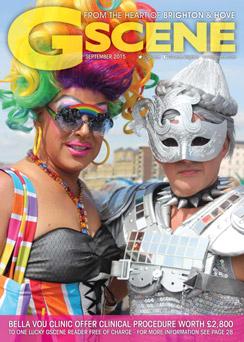
ARTSNEWS
FILIP CANHA - THE WALK
) Performance artist Filip Canha performed The Walk, a groundbreaking visual piece addressing people’s perception on trans rights, acceptance and vulnerability, in Brighton last month. It took Filip 582 hours to hand print the fabric of this costume, which had a 1950s Dior shape and featured a train 10m in length. The performance, which embodies the struggle and perseverance of trans and non-binary lives, intended to show the trans history of resilience but also sought to point out the setbacks in the decades-long struggle for self-identification. Filip’s work looks at queer and feminist performance aesthetics and theory; performative approaches to action/protest/activism in performance; relationship between difficulty and emotion (Affect) in art; technology; object and performance; and Body Politics: Performing Identity – Feminist and Queer Philosophies; transgenderism and performative notions of preconceived norms of masculinity and femininity. In Filip’s practice, they have been reinforcing ideas of latinx, genderqueer and affect.
Filip said: “[The Walk] shows that the repealing of the Gender Recognition Act (2004) and reform is undemocratic, explicitly harmful to trans lives, and has stunted the progress made on trans rights in the UK during the past 15 years. The ongoing Black Lives Matter protests have posed questions that we as allies can’t ignore regarding the wellbeing and safety of black transgender people, particularly black transgender women. We’re seeing the government amend laws to make it more complicated for trans people to transition and access facilities such as toilets and changing rooms. The performance depicts an intersectional approach to Trans Rights since ‘There is no such thing as a single-issue struggle because we do not live single-issue lives’ – Audre Lorde.” For more info, follow Filip on Facebook @filipcanha

DIGGING UP DOROTHY
) Digging Up Dorothy, a short film that follows a drag queen who stages a protest in a cemetery when she discovers the remains of Hollywood legend Judy Garland are going to be moved, is now available on Amazon Prime UK. Based on true events, the film’s screenwriter and lead actor Darren Stewart-Jones wrote the script after reading an article on Liza Minnelli’s plans to exhume her mother’s remains. “I was all set to walk the red carpet this film festival season,” says Darren, who plays drag queen Ruby LaRue. “Most of the festivals that the film was accepted into are either cancelled or postponed.” Darren was born in Liverpool but moved to Canada at a young age where he founded the Toronto Queer Theatre Festival eight years ago. He often visits London and is itching to get back once lockdown is over. “I just want people to see this film. It was a labour of love for me and I was so disappointed when festivals in Philadelphia and Atlanta that planned to show it were cancelled. Of course, safety had to come first.”
ÌFÉ - NIGERIA’S FIRST LESBIAN FEATURE FILM
) The first Nigerian lesbian feature film, titled ìfé – meaning ‘love’ in the Yoruba language – is due to be released online later this year in the country, marking a milestone for LGBTQ+ cinema in Africa. The film follows the relationship between Adaora (portrayed by Cindy Amadi) and her female partner (Uzoamaka Aniunoh) as they fall in love over the course of three days. Uyaiedu Ikpe-Etim directed the film in collaboration with Equality Hub, a non-profit organisation which aims to ‘amplify the voices’ of queer Nigerian women through
PAMELA ADIE
digital storytelling. Pamela Adie, a prominent LGBTQ+ in Nigeria, told Reuters there has never been a film like ìfé before in the country, and the reception to the film trailer ‘has been mad’. The official trailer has already been viewed nearly 15,000 times on YouTube. LGBTQ+ voices are commonly censored in Nigeria as queer people are often prosecuted under a variety of laws; in 2014, legislation was put into place that means those in same sex relationships may be jailed for up to 14 years. LGBTQ+ characters are rarely featured in African media, and 2018 Kenyan film Rafiki was banned for its lesbian-centric storyline. Pamela Adie believes that ìfé will help change Nigerian attitudes towards queer people by illustrating that ‘love is love’ and showing how prejudice and homophobia negatively affects LGBTQ+ people and their relationships. To view the trailer for ìfé, visit:
) The Trans Social Club is to host free event Found in Translation - In Conversation, featuring artists included in the Found in Translation online exhibition, on Wednesday, September 9 from 7pm. Presented by Trans Creative,
the online exhibition Found in Translation showcases 12 nonbinary, transgender and queer visual artists from the UK and North America. Working across a range of media to address the language of gender and queer perspectives, the exhibition celebrates nonheteronormative activism and diverse masculinities, and explores the evolution of the trans and nonbinary gaze. Launched as part of Trans Vegas Festival, the exhibition (until Monday, February 1, 2021), features the work of Ria Brodell, Flo Brooks, Cassils, Adham Faramawy, Fox Fisher, Alex J Gardner, Ebenezer Galluzzo, Izzy Kroese, Sade Mica, Evan Schwartz, Buzz Slutzky and Chester Tenneson. Found in Translation - In Conversation features a virtual curators' tour with Chester Tenneson and Zorian Clayton, and a webinar interview and Q&A with four of the participating artists, including Ria Brodell and Izzy Kroese.
D To tune in, visit
https://transcreative.uk/thetrans-social-club
F or check: www.facebook.com
/groups/transcreativesocialgroup/
E For more info, email
foundintranslationexpo@gmail.com
D or visit: https://found-in
translation.squarespace.com
ALL THAT BY SIMON ADAMS
REVIEWS
) ERROLL GARNER Plays Gershwin & Kern (Mack Avenue). American pianist Erroll Garner might come across as a showman, but his piano skills were immense, particularly his ability to improvise an introduction that bore little relation to the song in hand, only to slowly reveal what the actual song was after perhaps a few minutes. He could be playful and subdued, ebullient and subtle, but he was always entertaining. This fine album, first issued in 1976 – the last to appear in his lifetime (he died in early 1977) – presents 14 fine songs from those great American songbook writers, George Gershwin and Jerome Kern. You get all the greatest hits – I Got Rhythm, A Foggy Day In London Town, Nice Work If You Can Get It – and a few lesser known pieces – Lovely To Look At, a Kern song, anyone? An unreleased Garner original – Maybe You’re The Only One – ends this set in high style. ) MAJAMISTY TRIO Organic (Mistyland). In complete contrast is this exquisite set from a Serbian piano trio I wish I had heard of before. The trio is led by pianist Maja Alvanović, who wrote most of the eight tracks, who plays with classical poise and a fine sense of occasion. Never rushed, she quietly lays out the main themes and their variations as if she had all the time in the world. Alongside her, bassist Ervin Malina is tuneful and independent, often walking his own path beneath the piano-led lines, his arco a resonant delight, while drummer Lav Kovač, a new member of the trio, is quietly insistent. But this is a group that plays as one, an organic whole, as the title of this strong new CD suggests. Well worth checking out: available from Bandcamp and Amazon.
) JAMES COPUS Dusk (Ubuntu Music). Trumpeter James Copus has been making quite a name for himself in British jazz circles in recent years, and this, his debut album, has been much awaited. He’s assembled a fine rhythm section to support him, notably drummer Jason Brown, drummer to the trumpeter of the moment, Ambrose Akinmusire. All six compositions are the leader’s, a mixture of post-bop workouts and fusion moods that reflect his devotion to Blue Note jazz, notably Freddie Hubbard, and to the current New York scene. Copus himself is a fluent, precise player whose trumpet lines are always logical, while drummer Brown is best when following his own direction and ignoring the beat. Featuring strong compositions and with some excellent playing, this debut adds up to a fine release from a trumpeter with a great future ahead of him. ART MATTERS BY ENZO MARRA
DAVIE & HOCKNEY
CHRISTINE BINNIE AND JENNIFER BINNIE This month I’m concentrating on one more local gallery, the Towner in Eastbourne, which has three shows to view with social distancing and safety measures in place.
TOWNER GALLERY Eastbourne, www.townereastbourne.org.uk
ALAN DAVIE AND DAVID HOCKNEY: EARLY WORKS (until Sept 20). There is still an opportunity to experience the dual presentation of Davie and Hockney’s early works exhibition. The exhibition will explore the convergence between the two major figures of post-war British painting. Organised by Hepworth Wakefield, Early Works will bring together around 45 paintings, collages and drawings by Davie and Hockney, spanning between 1948 and 1965. Early Works includes figurative works made by both artists at the start of their careers, including self-portraits produced when Hockney and Davie were both 16 years old. Selfportraits and photographs throughout the exhibition will show the development of each artist’s public persona at a time when contemporary art was becoming a central part of popular culture, with artists appearing in films, being interviewed on television and featured in the new colour Sunday supplements. Both artists cultivated distinctive looks, exploring differing but connected notions of masculinity and identity. It’s advised for visitors to purchase tickets online to receive priority access in the event of queues. Tickets can also be purchased at the Welcome Desk while in the building. They are currently not accepting cash payments, so please be prepared to pay by card if you purchase your tickets in person. ) LAWRENCE ABU HAMDAN: THIS
WHOLE TIME THERE WERE NO
LANDMINES (until Sept 18). Recently acquired by Towner. Abu Hamdan is a Turner Prize-winning artist based in Beirut whose work looks into the political effects of listening, using various kinds of audio to explore its effects on human rights and law. An eight-monitor installation with sound, that uses collected mobile phone footage from 2011 to document a ‘shouting valley’ that lies in the contested area of the Golan Heights, Syria. This stretch of land became annexed by Israel from Syria following a ceasefire in 1967 and is dubbed ‘the shouting valley’, as the area’s topography allows for an acoustic leak across the border. Subsequently, separated families have gathered on either side of the border in order to shout across the divide to each other and remain in contact.
) CHRISTINE BINNIE AND JENNIFER BINNIE: ART, LIFE AND US and the Towner Collection (Sept 19-May 16, 2021). Christine Binnie and Jennifer Binnie have a long-standing connection with the Eastbourne area, their formative years spent attending Eastbourne College of Art and Design which firmly established their identities as artists. Along with Wilma Johnson, the sisters are founding members of The Neo Naturists, a performance art collective which evolved in the early 1980s in London. In this Towner exhibition, which they will curate, Christine and Jennifer will use their own work to complement pieces chosen from Towner’s Collection. Art, Life and Us will be the first Towner Collection exhibition guest-curated by artists.
CLASSICAL NOTES BY NICK BOSTON
REVIEWS
) Sir ARTHUR SOMERVELL Maud and A Shropshire Lad (Somm SOMMCD0615). Sir Arthur Somervell (1863-1937) is now chiefly known for his impact on the development of English art
song, following on from his teachers Stanford and Parry. Baritone Roderick Williams, joined by pianist Susie Allan, has recorded two of his song cycles, Maud and A Shropshire Lad, settings of Tennyson and A E Housman respectively. It’s hard to avoid comparing the settings of A Shropshire Lad with those of
Vaughan Williams, Ireland, Gurney and Butterworth – but to be fair, Somervell was there first. The wistful Loveliest Of Trees is followed by the youthful sentimentality of When I Was OneAnd-Twenty, before a darker bitterness of lost love creeps in in There Pass The Careless People. There are hints of darkness in In Summertime On Bredon, as the man’s young wife dies, and a moment of fragility in the penultimate Into My Heart An Air That Kills. But The Lads In Their Hundreds, that in other hands is so poignant, here leaves one slightly uncomfortable with the final verse’s heroic blaze of glory. Williams delivers the cycle with a clear and unfussy approach, without any overdramatic sentimentality. While I’m left a little underwhelmed by Somervell’s settings here, the same cannot be said of Maud, a much more dramatic tale, full of unspoken mental torment and disturbing emotions. Allan is impressive throughout in the complex piano accompaniments, and Williams once again delivers the narrative with clarity, here bringing out the greater range of dramatic expression. The darker undercurrents are brought out here too – the growing obsession in Maud Has A Garden surely borders on stalking, and Williams’ intensity of delivery, over the watery expressive accompaniment, is quite disturbing. There is fragility in the world-weariness of the final song, My Life Has Crept So Long, and it is left to the piano to introduce a more heroic style, the singer almost dragged along unwillingly to the final conclusion. Two other short songs, A Kingdom By The Sea and Shepherd’s Cradle Song, are added to the programme here. While this disc might not convince us that Somervell is an unfairly forgotten genius, the Maud cycle alone, and Williams and Allan’s strong performances throughout make this well worth exploration.
) FRANCIS POULENC Chamber Music Vol 2 (Paladino pmr0068). It is always a pleasure to find new recordings of Francis Poulenc’s (1899-1963) music, especially including works I’ve not come across before. Kicking off her second collection of chamber music, pianist Eva-Maria May is joined by cellist Martin Rummel for the Suite Française D’Après Claude Gervaise. Gervaise was a French Renaissance composer, and this suite was originally an
EVA-MARIA MAY orchestral suite, which Poulenc revised for cello and piano. There are beautifully lyrical lines for the cello in the slower movements particularly, and the resonant recording and Rummel’s rich tone give these extra warmth. They follow this with Sérénade, with its gently lilting sicilienne rhythm and beautifully lyrical melody. Next comes music for the stage – music to go with a play by Jean Anouilh, the comedy L’Invitation Au Château. This forms in effect another suite, for violin (Corinna Desch), clarinet (Andreas Schablas) and piano. The music is great fun, with swirling waltzes, balletic and circus-like capers, the odd polka and tango thrown in, as well as snippets of a Chopin-esque mazurka. All three players here relish the lyrical melodies, balletic leaps and luscious harmonies. Flautist Ahran Kim joins for two pieces – firstly a solo, Un Joueur De Flute Berce Les Ruines. Again, the reverberant recording adds to Kim’s smooth sound in this brief but beautiful, twisting and turning melody. She follows this with Villanelle, for piccolo and piano, with a similarly simply lilting melody, initially matched by a single piano line, then with rippling harmonies added. For the remainder of the disc, May is joined by baritone Damien Gastl, firstly for two short songs, La Souris and Nuage, and then the cycle La Travail Du Peintre, which characterises artists, including Picasso, Chagall, Klee and Miró. Gastl has a distinctive tone, and he conveys the text with precision and conviction. He is sweet at the top of his range, and he meets the challenges of the leaping vocal line in Klee well, and the mysterious Miró and weighty Villon (with highly effective bellringing piano from May) are strongly evocative. A fascinating and impressively performed collection of some lesser-known Poulenc here.
) CECILIA MCDOWALL Everyday
Wonders: The Girl From Aleppo
(Convivium CR054). It’s a tall order to cover issues such as child refugees, disability and war in a cantata for children, commissioned for the young singers of the
National Children’s Choir of
Great Britain, in a way that speaks without coming across as superficial or over-worthy. But Cecilia McDowall’s (b.1951) cantata, Everyday Wonders: The Girl From Aleppo, is in fact highly effective and moving, given strength by the truth of the remarkable story it tells in its five short movements. Nujeen Mustafa, a Kurdish teenager with cerebral palsy, left Aleppo and travelled, in her wheelchair, with her sister, some 3,500 miles to Germany, where she found refuge. Kevin Crossley-Holland has drawn on her biography for the cantata’s libretto. The young singers, directed by Dan Ludford-Thomas, are joined by violinist Harriet Mackenzie and pianist Claire Dunham. The work moves from the initial flight from a war-torn Aleppo, with ‘thousands milling at the border’ in the second movement, with effective whispering and chanting repetition, stamping and clapping effects, and shushing sea spray as they make the journey across water. One could easily be cynical about the sweet
CECILIA MCDOWALL
welcome of the German policeman when they finally arrive safely, greeted with ‘Wilkommen! Welcome to Germany!’, but this is a powerful moment, with the piano briefly quoting Beethoven’s Ode To Joy, and the final movement’s depiction of Nujeen’s new life is very touching. The young singers perform with clear diction throughout, with tuning only a minor issue in some of the chorale sections. A powerful reminder of the power of music to involve young people and communicate strong messages – in these strange times, I only hope the opportunity for young people to get involved in such projects will return soon.
MORE INFO
For more reviews, comment and events, visit: N nicks-classical-notes.blogspot.co.uk T @nickb86uk ) nbclassical@hotmail.co.uk
PAGE’S PAGES BOOK REVIEWS BY ERIC PAGE
) OKECHUKWU NZELU THE
PRIVATE JOYS OF NNENNA MALONEY
(www.hachette.co.uk, £16.99). I read this in one go, it bounced along with the narrative possessing me, keeping me enthralled and entertained in equal measure. What a fun read, with some seriously contemporary takes on modern UK life. The book follows protagonist Nnenna Maloney growing up into a possibly queer woman and seeking more understanding of her Igbo-Nigerian culture and of her absent father. Her searching and wanting some insight (and answers), straining her relationships with her mother Joanie. Around these two swirl a selection of warm characters, all on their own journeys of self-expression, seeking meaning in their intersectional identities. Set in present day Manchester, which forms the backdrop for Nnenna’s adventures, this northern metropolitan voice is endlessly funny. Sharply observing the contradictions of modern urban life, sharing a delighted love of the city of Manchester, and of its weirdly adorable residents, Nzelu’s voice, original and so beautifully bold, gives us insight into Nnenna’s world as she finds some answers, but unfurling more questions on race, sexuality, class and the whys and hows of belonging. The book gives a warm, deep insight into how what you are doesn't define how you can or should be, but done with wit and some redemption along the way.
) DUSTIN LANCE BLACK
MAMA'S BOY
(www.johnmurraypress.co.uk, £16.99). This, a painful, honest book about being queer, poor, different and loved, is a memoir from Dustin Lance Black - famous LGBTQ+ role model, and husband of diving champion Tom Daley. The book is also a beautiful elegy to Black’s Mormon traditional mother and to all mothers, and the power of family, honesty, understanding and accepting difference, and following your own truth. An Oscar-winning screen writer (Milk) and activist, Black examines his very humble and poor rural upbringing in Texas. It’s not a narrative you hear much of in America, with its shiny, comfy lifestyles, but Black lets us see the struggle his mother went through to support, feed and protect her family. And to accept that they were not going to become the straight Mormon boys she was hoping for. He’s honest about his own failings, always reassuring in a memoir, and acknowledges people who have inspired, helped and supported him. His mother comes across as a working-class heroine, full of fire and social justice and unconditional love. Finding ways through their vast difference to understand and respect the choices of her family. Elevating past variance to find connection and hope. The book made me cry, touched me with its honest approach to grief, loss and the difficulties of moving on. He holds up the real angels in his life, his brother and mother, both now dead. With a
candour, which is unsentimental but tender and embracing, tells us their, and his story. Always focused slightly off himself, showing how he stands on the shoulders of his family to become the proud, strong and remarkable humble man he is today. Black’s book resonated with me, my own poor and humble start in life, and the way that some of us are so very lucky to have mothers who have fire in their hearts and light a flame in ours. Recommended.
) KIRSTY LOGAN
THINGS WE SAY IN THE DARK
(www.penguin.co.uk, £8.99). Oh Logan, what marrow rich prose you do. This collection of stories, all crepuscular, shaded and of the dark side, are a delight. Logan reminded me of Poppy Z Brite, utterly convincing and then a sentence turns and shocks you right off the page. The book talks to us, the author is writing it as we read it, with a collection of side notes as we move through it. Her control of the narrative is thrilling, set against domestic moments in the Icelandic retreat where it’s being composed. From creepy supernatural stories through to modern feminist fairy tales, which could have come from Angela Carter, this collection is something special. The stories examine, from a woman's perspective, themes of life, fear, flesh and violence. Mothers, children, compromise, struggle. Logan's forensic prose peeling back the skin of dreams to reveal the rawness below. The tension in them is palpable and the words slide into your imagination, uncoiling their tendrils and sending shivers through your mind. This is horror wrought quietly effective. Dreadful men get their awful comeuppance. There is no escape here.
Her use of setting and conversation in the stories draws you on, leading you down into some dark spaces. Always in control, Logan shows us the Stygian side of imagination and then leaves us there, in the cold, dank dark, alone with this writhing book. Shudder!










